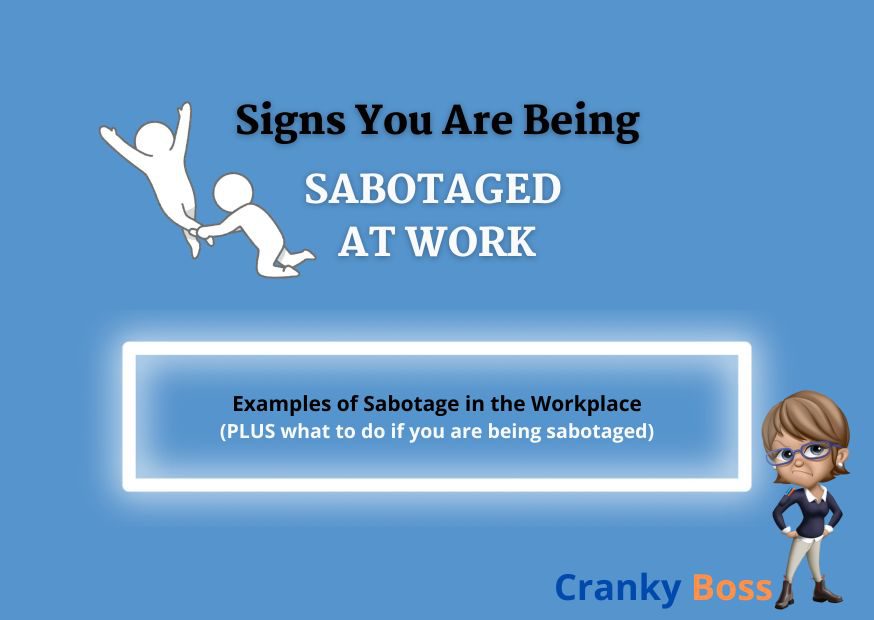Workplace sabotage can be a hidden but destructive force that undermines your efforts and success. Recognising the signs early can help you take action to protect yourself and maintain your professional integrity. Let’s explore the various forms of sabotage, how to identify them, and what steps you can take to address and prevent them.
What is the Meaning of Sabotage?
Sabotage refers to deliberate actions taken to damage, obstruct, or destroy someone’s work, reputation, or career. In the workplace, sabotage can manifest in various ways, from minor acts like spreading gossip to more serious offenses like tampering with your work or equipment. The primary objective of sabotage is to create obstacles for the target, making it difficult for them to succeed or maintain a good standing in their job.
What does undermine mean?
The word “undermine” means to weaken or damage something or someone gradually and often in a covert or subtle manner. In a workplace context, undermining involves actions or behaviours aimed at reducing someone’s effectiveness, credibility, or success without direct confrontation.
What is Undermining Behaviour at Work?
Undermining behaviour at work is any action taken by a colleague or supervisor that is meant to harm your performance, reputation, or career progression. These actions are often subtle and covert, making it hard to identify them directly. It is otherwise known as covert bullying.
Examples of undermining behaviour include belittling someone, patronizing, spreading rumours, withholding important information, taking credit for your work, snitching and intentionally providing incorrect or misleading information.
Gaslighting, where someone manipulates you into doubting your own perceptions and judgments, is also a common undermining tactic.
The goal is usually to make you look incompetent or unprofessional, thus damaging your standing within the company.
How to Tell if You are Being Sabotaged at Work?
Decreased Information Flow
One of the key signs of sabotage is a sudden decrease in the flow of information. If you notice that you are not receiving important emails, invitations to meetings, or updates on projects, it might be a sign that someone is deliberately keeping you out of the loop.
Unwarranted Criticism
If you find yourself receiving an unusual amount of criticism for your work, especially if it’s not constructive, it could be an indication of sabotage. This is particularly true if the criticism comes from someone who has a vested interest in seeing you fail. This can also occur in the form of frequent and petty interruptions in meetings.
Mistakes and Miscommunications
Frequent mistakes or miscommunications that seem to stem from someone else’s actions could be another red flag. If your instructions are often misunderstood or your work is consistently undermined by others, it might not be accidental. In fact weaponized incompetence may be at play. This deliberate inefficiency forces you to take on additional work, while the other person avoids responsibility. If your productivity suffers as a result, it can even make you appear ineffective—further undermining your credibility and sabotaging you.
Exclusion from Important Activities
Being left out of important activities, meetings, or decisions is a common tactic used by saboteurs. If you are consistently not included in meetings where your input is necessary, it might be a sign that someone is trying to diminish your role or visibility within the organization.
Sabotage of Work
Finding your work tampered with or discovering that someone has made unauthorized changes to your projects is a clear sign of sabotage. This could include altering documents, deleting files, or otherwise interfering with your tasks.
What is an Example of Sabotage in the Workplace?
An example of workplace sabotage is a colleague intentionally giving you incorrect information about a project deadline, causing you to miss it and appear unreliable. Another example could be a coworker lying about you or spreading false rumors about you or engaging in malicious gossip to damage your reputation or stealing your ideas and presenting them as their own to higher-ups.
Signs Someone is Trying to Set You Up at Work
Fabricating Evidence
If someone is trying to set you up, they might fabricate evidence to make it look like you made a mistake. This could include altering documents or emails to create a false narrative about your performance.
Witness Recruitment
Another tactic is backstabbing or recruiting witnesses to back up false claims against you. If you notice colleagues suddenly turning against you or supporting false accusations, it might be a coordinated effort to sabotage you.
Unreasonable Expectations
Setting unreasonable expectations or deadlines that are impossible to meet can be a way to set you up for failure. This makes it easier for the saboteur to highlight your inability to perform under pressure.
Blame Shifting
If someone is consistently blaming you for their mistakes or for problems that you had no control over, it could be a sign that they are trying to set you up. This tactic is used to make you look incompetent or irresponsible.
What to Do if You are Being Sabotaged at Work?
Document Everything
The first step in dealing with sabotage is to document everything. Keep a record of all communications, incidents, and actions that seem suspicious. This documentation can be crucial if you need to escalate the issue to HR or management.
Communicate Clearly
Ensure that you communicate clearly with your colleagues and supervisors. Your communication style and modifiers is important here. Miscommunication can often be used against you, so it’s important to have everything in writing. Follow up verbal conversations with email summaries to have a record of what was discussed.
Seek Support
If you suspect sabotage, seek support from trusted colleagues or mentors. They can provide advice, support, and potentially witness the behaviour if it escalates.
Report the Behaviour
If the sabotage continues, report the behaviour to your HR department or a higher authority within the company. Provide them with your documentation and any evidence you have gathered to support your claims.
Focus on Your Work
While dealing with sabotage, it’s essential to maintain focus on your work. Don’t start trying to find excuses to not show up to work. Instead, continue to perform to the best of your ability and avoid giving the saboteur any legitimate reason to criticise your performance.
How to Stop Someone from Sabotaging You?
Address the Issue Directly
If you feel comfortable, address the issue directly with the person you believe is sabotaging you. Sometimes, a frank conversation can resolve misunderstandings and discourage further sabotage.
Set Boundaries
Establish clear boundaries with the person causing problems. Be assertive about your needs and expectations in a professional manner. This can deter further attempts to undermine you.
Strengthen Your Network
Build a strong professional network within your organization. Having allies can help protect you from sabotage and provide a support system if issues arise.
Improve Your Visibility
Increase your visibility within the organization by participating in meetings, volunteering for projects, and maintaining open lines of communication with supervisors. The more visible and involved you are, the harder it is for someone to sabotage you without being noticed.
Employee Sabotaging Other Employees
Employee sabotage can take many forms, from spreading malicious rumours to tampering with someone’s work. It often stems from jealousy, competition, or personal grievances. Such behaviour can create a toxic work environment, lower morale, and decrease productivity.
Why Do Employees Sabotage Each Other?
- Competition: In highly competitive workplaces, some employees might resort to sabotage to get ahead.
- Jealousy: Envy of a colleague’s success or recognition can lead to sabotage.
- Deflection: Deflection can lead to sabotage when incompetent individuals redirect attention away from their shortcomings, often undermining their colleagues in an attempt to protect their own image and avoid accountability.
- Personal Conflicts: Personal animosities can spill over into professional sabotage.
- Job Insecurity: Fear of losing their job might drive employees to undermine others to appear more indispensable. Some resort to task masking—stretching tasks, scheduling unnecessary meetings, or creating the illusion of busyness—to seem more productive and efficient than others
- Tokenism: Individuals who are employed symbolically or on appearance rather than fostering a diverse and equal work environment may find themselves on the receiving end of hostility. Tokenism in the workplace can have negative consequences.
Signs Your Boss is Sabotaging You
Micromanagement
If your boss is excessively micromanaging you, it might be a sign of sabotage. This can include over-scrutinizing your work, questioning your every move, and not allowing you any autonomy.
Withholding Resources
A boss who withholds necessary resources or information can be sabotaging your ability to perform effectively. This can include not providing training, tools, or support needed to complete your tasks.
Public Criticism
Publicly criticizing or belittling you in front of colleagues can be a tactic used by a sabotaging boss. This behaviour is meant to undermine your confidence and reputation.
Exclusion
If your boss excludes you from important meetings, projects, or communications, it might be a deliberate attempt to undermine your role and effectiveness within the team.
Unfair Evaluation
Receiving unfair or overly negative performance evaluations, especially when they don’t align with your actual performance, is a clear sign of sabotage. This can impact your career progression and morale.
Summing Up
Workplace sabotage is a serious issue that can affect your job performance, career progression, and mental well-being. Recognizing the signs of sabotage and taking appropriate steps to address it can help you protect yourself and maintain your professional integrity. Always document incidents, communicate clearly, seek support, and report any harmful behaviour to the appropriate authorities within your organization. By staying vigilant and proactive, you can mitigate the effects of sabotage and continue to thrive in your career.

